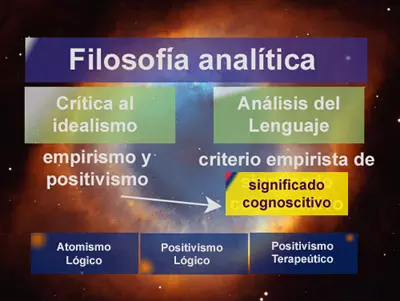A broad set of different schools with some common points are framed under the label of “analytical philosophy”. As a result of Nazism, many German groups were forced to emigrate from their countries of origin, so the movement ended up geographically concentrating on the Anglo-American world. Here are some of its predominant features:
Criticism of idealism led to the recovery of the English philosophical tradition: empiricism and paradoxically, this return to empiricism took place in the cradle of English idealism: Cambridge. Another center of analytical philosophy will be Vienna.
At least the first two generations of representatives of this school, were outstanding scientists in the field of mathematics and physics. Consequently, the denial of the value of metaphysics and the consideration of natural sciences as the only valid sciences resurfaces.
If metaphysics lacks all value, then what will be the object of philosophy? The answer that appears is: “the analysis of language”. The understanding of this topic varies according to thinkers and schools. Analytical philosophy conceives the analysis as follows:
& #9658; Language analysis, meaning from which it differs from empiricism since they will not be devoted to psychological analysis. It is an analysis oriented towards linguistics and propositions.
& #9658; Analysis can be done in a double direction: through formalism or logical analysis of scientific language and “antiformalism” or linguistic language language of common language.
Philosophy will thus be an activity more than a substantive knowledge: it will be the activity of language analysis. Such an analysis will aim at clarifying philosophical and scientific concepts. Language will not be so much the object of research (as in the philosophy of language) as the means through which the analysis will be performed, and analysis will show that most philosophical problems, not their totality are not without false problems created by the very nature of language. So the rejection of metaphysics shifts the emphasis from the limits of knowledge (as in Hume or Kant) to subscribe to the limits of language, while the propositions of metaphysics lack meaning: “what cannot be spoken about, it is better to shut up” (Wittgenstein) In this line, he will say Russell, for example, that the Swedish-Predicate Strucutra was the one that led to the creation of the philosophical distinction of substance-accident, which amounts to falling into the “traps” of language.
 According to the classification of Russell, three currents have to be distinguished:
According to the classification of Russell, three currents have to be distinguished:
This school, represented by Russell, Moore and Wittgenstein, emerges as a reaction against the idealism of Bradley, which presupposed a monist logic in which everything is constituted by a set of “inner” relationships that bind the whole Universe which is an “interdependent All”, so that it is not possible to know a thing without knowing the whole universe. The proposal of Russell will oppose this view: atomist logic assumes that the world is composed of independent and isolated entities, which can be known without reference to the rest of the universe, directly in themselves. It should be noted that Russell and Wittgenstein were specialists in mathematical logic, logic that will serve as a model for a new conception of the world (just as geometry had been the instrument of rationalists, the physics of Newton that of Hume and Darwinian evolutionism that of many thinkers of the 19th and 20th centuries). In short, logical atomism will postulate that the structure of the world is that of mathematical logic.
For logical positivism, there are only two kinds of propositions that possess cognitive meaning: analytical and synthetic. This distinction is not novel, since Kant and Hume had worked on this line which implies that the truth or falsehood of an analytical proposition is established from its logical form: either it is necessarily true or false (tautology or contradiction). On the other hand, synthetic propositions require some kind of verification outside logical procedures.
On the other hand, all the propositions of logic and mathematics are analytical insofar as they do not refer to the facts of the real world and their validity is established not from experience but a priori. This is a move away from the empiricism from Mill and Spencer and also from Kant.
So, except for the propositions of logic and mathematics, all are propositions are synthetic and their meaning can be:
& #9658; Cognitive or descriptive: information about “facts”
& #9658; Emotional: referring to the plane of emotions
In this way, the “empiricist criterion of cognitive meaning” is the procedure that allows us to determine which propositions can be considered scientific and which can not be considered. It is, in fact, an instrument of demarcation of science. It should be clarified that mathematical logical propositions lack cognitive meaning, since they are only rules for the use of the signs of science.
The latter is given various denominations such as “therapeutic positivism” or simply “analytical philosophy”. It is also known as Cambridge and Oxford Schools.
In a second moment, Wittgenstein changes profoundly generating a break with all of the above. Language ceases to be a figure of facts, admitting that there are plurality of languages each of which is a way of relating to the world, a way of life. The fundamental thing is that language is an activity and there is only its use. On the other hand, its plurality escapes any systematic attempt. Thus the task of philosophy must be limited to the descriptive and normative function of language and to the therapeutic function, in its legitimate metaphysical use.